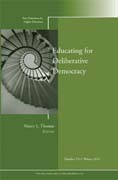
What needs to be done to strengthen U.S. democracy, to make it work the way it should? Each generation of Americans asks some version of this question, butthis book offers an answer that recognizes the heightened urgency and hopefulness in the way we are asking the question today. At the heart of the debate is a conviction that persistent public problems call for dialogue and deliberation that results in collective action by diverse groups of informed, skilled motivated, and prinicipled citizens--what many call deliberative democracy. In thie book, contributing authors and editor Nancy L. Thomas focus on the uniquerole that higher education can play--alongside private, civic and government sectors--in the collaborative process of strengthening and fostering deliberative democracy. What makes deliberative democracy so appealing is that it holdsequal promise for democratic renewal and students' learning. Its principles--inclusion, reason, neutrality, respect, and collegiality--can also guide the academy toward more democratic dialogue and political deliberation about the problems facing our communities, our nation, and the world, more examination of the values tensions that public problems enger, and more learning about how toimprove people's lives, build communities, and strengthen democracy. This is the 152nd volume of the Jossey-Bass quarterly report series New Directions forHigher Education. Addressed to presidents, vice presidents, deans, and other higher-education decision-makers on all kinds of campuses, New Directions for Higher Education provides timely information and authoritative advice about major issues and administrative problems confronting every institution. INDICE: EDITOR'S NOTES (Nancy L. Thomas). 1. Teaching and Learning Civility (Peter Levine) Incivility can obstruct constructive public discourse and problem solving. Restoring civility is a task for higher education, but it may require tradeoffs with other democratic values. 2. Putting Politics Where It Belongs: In the Classroom (Diana Hess, Lauren Gatti) Teaching university studentsthrough discussing controversial issues has the potential to build civic capacity and political tolerance. 3. The Difficult Dialogues Initiative at Clark University: A Case Study (Sarah Buie, Walter Wright) This initiative works to foster a culture of dialogue on the campusraising awareness of discourse itselfand encouraging skills and attitudes of responsible citizenship across our community. 4. Intergroup Dialogue and Democratic Practice in Higher Education (Gretchen E. Lopez, Ximena Zúñiga) Participants in intergroup dialogue examine the significance of social identities and social inequalities and practice intergroup communication and collaboration skills. 5. 'To Establish an Effective Community Spirit': A Land Grant Extension and Deliberative Dialogue (Monica Herrera, Joyce Hoelting) A Land Grant Extension at the University of Minnesota was part of 'Horizons,' a program using dialogue-to-action tools to address rural poverty. 6. Facilitating Democracy: Centers and Institutes of Public Deliberation and Collaborative Problem Solving (Martín Carcasson) Campus-based centers and institutes serve as hubs for local dialogue, deliberation, and collaborative problem solving. 7. Research for Democracy and Democracy for Research (Kiran Cunningham, Matt Leighninger) Action research is a promising vehicle for filling gaps in our knowledge of deliberation and democratic governance. 8. Power, Privilege, and the Public: The Dynamics of CommunityUniversity Collaboration (Byron P. White) The dynamics of institutional power need to be addressed through structural practices that support prospects for authentic, democratic partnerships. 9. Democratizing Academic Professionalism Inside and Out (Albert W. Dzur) Academic professionals need to embrace and facilitate democratic modes of public problem solving while retaining traditional scholarly commitments.10. The Politics of Academic Freedom (Nancy L. Thomas) Institutional leaders,faculty, students, and the public need a better understanding of why academicfreedom is essential to student learning and to a democracy characterized by vigorous and balanced political discourse. 11. Practicing What We Preach: Democratic Practices in Institutional Governance (Bruce L. Mallory) Strategies formoving closer to effective forms of shared governance, using deliberative approaches that sustain faculty authority over the academic mission. 12. Higher Education's Democratic Imperative (Nancy L. Thomas, Matthew Hartley) Where do we go from here? Next steps for higher education. ADDITIONAL RESOURCES INDEX.
- ISBN: 978-1-1180-3245-9
- Editorial: John Wiley & Sons
- Encuadernacion: Rústica
- Páginas: 112
- Fecha Publicación: 07/03/2011
- Nº Volúmenes: 1
- Idioma: Inglés
